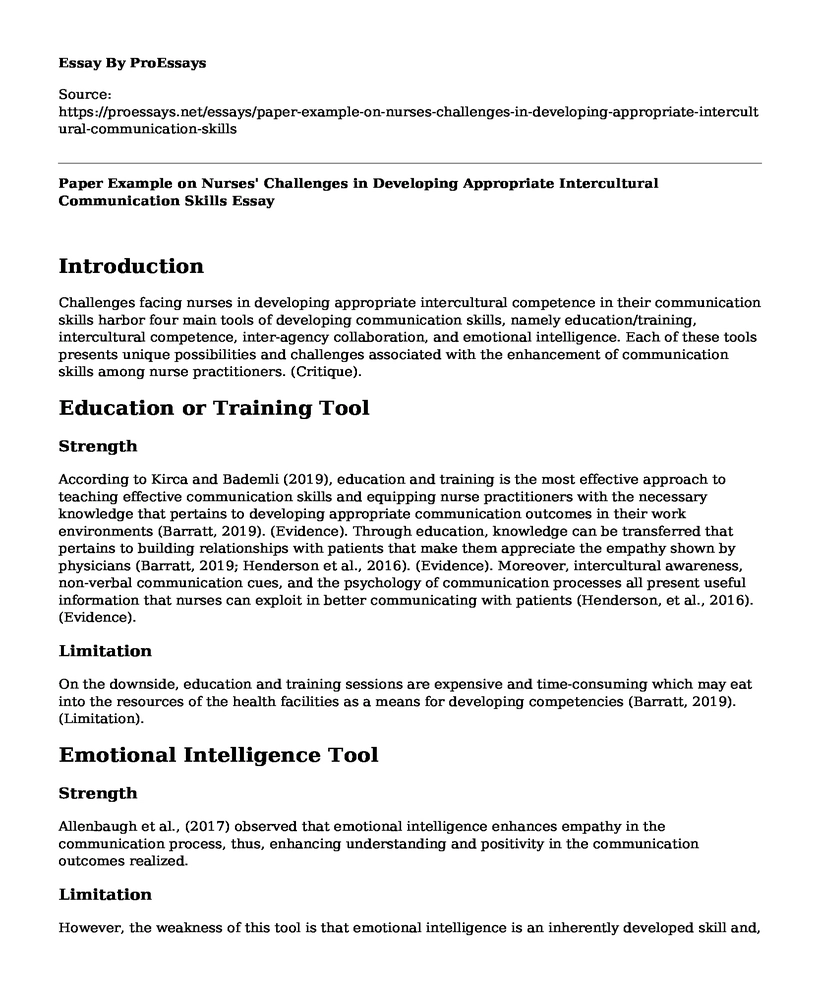Introduction
Challenges facing nurses in developing appropriate intercultural competence in their communication skills harbor four main tools of developing communication skills, namely education/training, intercultural competence, inter-agency collaboration, and emotional intelligence. Each of these tools presents unique possibilities and challenges associated with the enhancement of communication skills among nurse practitioners. (Critique).
Education or Training Tool
Strength
According to Kirca and Bademli (2019), education and training is the most effective approach to teaching effective communication skills and equipping nurse practitioners with the necessary knowledge that pertains to developing appropriate communication outcomes in their work environments (Barratt, 2019). (Evidence). Through education, knowledge can be transferred that pertains to building relationships with patients that make them appreciate the empathy shown by physicians (Barratt, 2019; Henderson et al., 2016). (Evidence). Moreover, intercultural awareness, non-verbal communication cues, and the psychology of communication processes all present useful information that nurses can exploit in better communicating with patients (Henderson, et al., 2016). (Evidence).
Limitation
On the downside, education and training sessions are expensive and time-consuming which may eat into the resources of the health facilities as a means for developing competencies (Barratt, 2019). (Limitation).
Emotional Intelligence Tool
Strength
Allenbaugh et al., (2017) observed that emotional intelligence enhances empathy in the communication process, thus, enhancing understanding and positivity in the communication outcomes realized.
Limitation
However, the weakness of this tool is that emotional intelligence is an inherently developed skill and, thus, can only be developed through individual efforts and dedication. (Limitation).
Intercultural Intelligence Tool
Limitation
Allenbaugh et al. (2017) likened intercultural intelligence to emotional intelligence as it is a skill that is self-taught and self-learned. Therefore, its limitation is that it requires individual initiative to effectively execute.
Strength
On the other hand, the strength of the intercultural intelligence tool is that it allows the individual to develop empathy, awareness, and sensitivity to different cultural practices and traits. Hence, enhancing understanding of the intercultural communication process.
Inter-Agency Collaboration Tool
Strength
Finally, the inter-agency tool's strengths lie in collaboration between staff members drawn from different departments.
Limitation
The downside of the inter-agency collaboration tool is that it has to adopt a definite organizational structure that spells out the channels of communication and hierarchy that may stifle the effective communication process (Andre et al., 2016; Barratt, 2019). (Limitation).
Cite this page
Paper Example on Nurses' Challenges in Developing Appropriate Intercultural Communication Skills. (2023, May 29). Retrieved from https://proessays.net/essays/paper-example-on-nurses-challenges-in-developing-appropriate-intercultural-communication-skills
If you are the original author of this essay and no longer wish to have it published on the ProEssays website, please click below to request its removal:
- Spiritual Care and Worldviews in Nursing
- How to Implement a Public Health Campaign Essay
- Paper Example on Cyberbullying Victimization: Research From Navarro to Tokunaga
- The Woman Who Hates Fat - Article Analysis Essay
- Essay Sample on Revolutionizing Healthcare: Less Waste, More Value, Better Outcomes
- Human Papillomavirus: Cervical Cancer, Genital Warts, Vaccine Options - Essay Sample
- Women Exclusion from Mainstream News: A Legacy since 18th Century - Essay Sample







